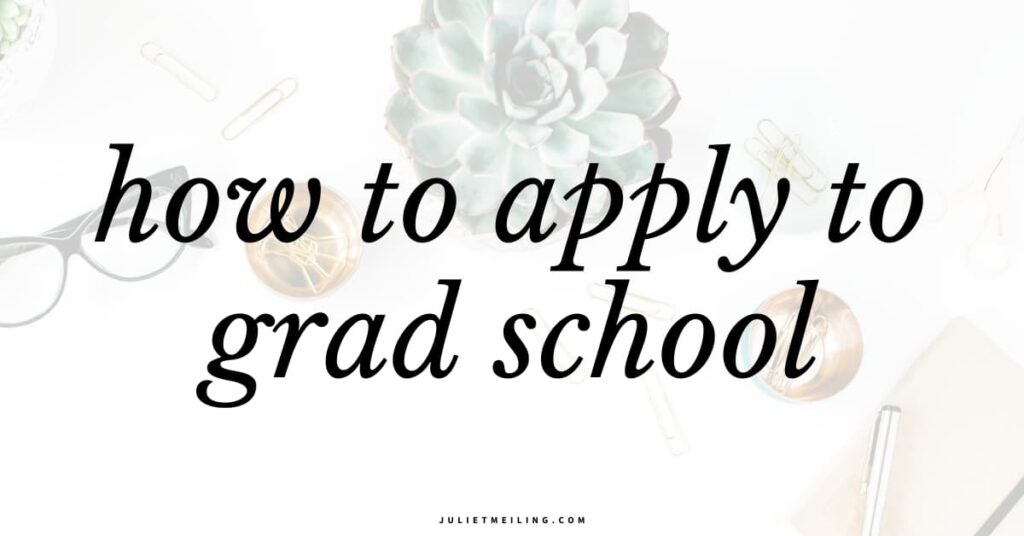How to Get Into Graduate School: An In-Depth Guide
Applying to graduate school doesn’t have to be overwhelming. Learn how to apply and stand out on your grad school applications with this comprehensive guide.
Do you have big dreams about going to graduate school, but have no idea what graduate school admissions committees are looking for or even where to start?
The graduate school application progress, at first, seems overwhelming and well… a lot of work.
And I won’t lie to you: it is A LOT of work.
But it’s totally worth it once you get that acceptance letter in the mail!
In today’s blog post, we will be going over everything you need to know about applying to graduate school.
- Applying to graduate school doesn't have to be overwhelming. Learn how to apply and stand out on your grad school applications with this comprehensive guide.
- Get started from square one: Know your application deadlines and requirements
- How do I make myself competitive for grad school? Hint, it all starts in undergrad.
- What if I'm going back to graduate school after a year or more out of college? How can I stand out on my grad school applications?
- Taking the GRE (or GMAT)
- Getting letters of recommendation for graduate school
- How to write a killer personal statement or statement of intent
- How to create a stellar resume or curriculum vitae
- Preparing for your graduate school interview
- What if I don't get into graduate school?
- Concluding thoughts on how to apply and get into graduate school
- Thanks for reading about how to make yourself competitive for grad school.

*This post may contain affiliate links. Purchasing a product or service through an affiliate will earn me a small commission at no additional cost to you. Please read our Disclaimer Policy for more information about the use of affiliate links on this site.
Get started from square one: Know your application deadlines and requirements
Before you even start the graduate school application progress, it is a good idea to take a look at exactly what information you need to fill out your application and when the application is due.
Just take 10-30 minutes, depending on how many graduate school programs you are intending on applying to, to visit the graduate admissions website of each program and jot down the application requirements and their respective deadlines in your planner or calendar.
You should then go a step further and make a plan of action of when you will fulfill these deadline requirements.
For example: You could dedicate 1-2 hours per week to tackle the different aspects of your graduate school applications.
When I was applying to graduate school I started with the easiest tasks first, like creating my resume, and then I moved on to the harder tasks like writing my personal statement.
How do I make myself competitive for grad school? Hint, it all starts in undergrad.
I’m going to be quite blunt here: college is not high school and what you do during your undergraduate degree does matter if you intend on applying to graduate school and want to make a good impression on your grad school application.
Sure, it’s ok to not have the most stellar freshman year, but once you get into the groove of college and get a clearer idea of what you want to do for a career you seriously need to buckle down and make the most of your undergraduate degree.
So what do I mean by buckling down?
Develop good study habits and implement them to make good grades
One of the most important values that determine whether or not a graduate school admissions committee even looks at your application is your grade point average or GPA.
Many universities have guidelines on what minimum GPA they are willing to accept (or even consider admitting) into their program.
PrepScholar states that, “The most common GPA needed for grad school is 3.0, though exact grad school GPA expectations can vary a lot by program.”
Keep in mind that a graduate school program’s GPA requirement is dependent on many factors such as the program’s subject, competitiveness, and funding opportunities.
But even if a graduate school program requires a minimum 3.0 GPA that does not mean you only need to have the minimum GPA to be accepted.
The graduate school application process is rigorous and there are hundreds, if not thousands ,of students applying to your exact program.
So in other words, you need to have a stellar GPA.
If you want to get into graduate school you need to aim for a high GPA.
Earning a high GPA requires constant learning, developing, and improving your study habits.
Here is a brief list of good study habits you can implement:
- Create a study plan for the semester
- Use a time management strategy like time blocking or the Pomodoro technique
- Create a productive study space for yourself
- Study in increments over time, do not cram the night before a test
- Find a study group or study buddy to help keep you accountable
- Seek help when needed from a professor or tutor
- Use a variety of study techniques to solidify information
You may also like: How To Stay Motivated To Study In College
Be intentional with the extracurriculars you do in college
If you want to get into graduate school you need to be strategic of how you spend your free time.
Every university has a ton of clubs, activities, and organizations you can participate in and join, but you need to be careful about where you put your time and energy.
It’s ok if you want to join a sorority–it can be a great place to network–or the gardening club, but if you want to get into graduate school you need pick at least one or two on-campus clubs/activities/organizations that pertain to your graduate school program of choice.
For example, if you are planning to go to graduate school to become a physician’s assistant is there are club or organization, like a Pre-PA Club, you could join to network with other prospective and current PAs?
Many universities have a club and organization database where students can search for clubs and organizations to join related to their career interests and prospective graduate school program.
Try to google your university and add “clubs and organizations” after it. For example: Boston University Clubs and Organizations.
You may also like: The Top Qualities of Successful College Students
Actively seek out and pursue opportunities in your field of interest
Graduate school admissions love when prospective graduate students have experience.
Whether it be an internship, shadowing a professional in your desired field, or becoming an undergraduate teaching assistant or research assistant, these opportunities and experiences are what graduate schools want to see on your resume/curriculum vitae and in your personal statement.
But don’t worry about doing all four experiences or opportunities that I mentioned previously–brownie points if you can–but definitely seek out at least one of these opportunities to:
- Add to your resume
- Gain skills related to your field of interest
- Discover if you like the field you want to go to graduate school in
- Potentially have an additional person you could ask to write you a letter of recommendation
Develop good relations with professors, bosses, and mentors
One of the keys to getting into graduate school is having solid letters of recommendations. And unfortunately, you can’t have your mom or your best friend write you a letter of recommendation.
Instead, you’ll need to ask relevant professors, your boss at work, or a mentor to write you a letter of recommendation.
And usually, graduate school programs at looking for 2 to 3 letters of recommendation, so it is ideal that you have twice as many people in mind that you could go to and ask for a letter of recommendation.
To develop good relationships with professors or your boss at work try to:
- Go the extra mile
- Ask thoughtful questions or solutions to problems
- Speak to them frequently
- Ask for opportunities to work on projects with them
What if I’m going back to graduate school after a year or more out of college? How can I stand out on my grad school applications?
You do not, by any means, have to attend graduate school right after graduating from college. And actually, I personally think it is better to work a year or two before going to graduate school to solidify your decision to go do graduate school.
One of the best pieces of advice I received in graduate school was to try to use my undergraduate degree first. And if it seems like I can’t be successful with it, then go back to graduate school.
So if you take a gap year or two before going back to graduate school take this time to:
- Do an internship in the field you want to go to graduate school for
- Work in a related or the same field you want to go to graduate school for
- Retake classes you need to get into your desired grad school program
- Retake classes to improve your GPA for your grad school applications
- Shadow a professional in the field you want to go to graduate school for
Taking the GRE (or GMAT)
The Graduate Record Examinations (GRE) or the Graduate Management Admission Test (GMA) are two of the most common standardized tests for graduate school admissions . It is like the ACT or SAT for college admissions.
However, it is important to look at your graduate school program’s requirements regarding which standardized test you should take.
Some programs may:
- Require only the GRE or only the GMAT
- Require either the GRE or GMAT (you get to chose which one you take)
- Do not require the GRE or GMAT at all
And just like the ACT and SAT many people and test prep services are going to scream and shout from the rooftops how important it is to get the highest score as possible.
And then they will sell you all these study prep materials and courses. And, as a result, you will most likely feel completely overwhelmed.
However, don’t fret.
The GRE is (I’ve never taken the GMAT, so we’ll only discuss the GRE from here on out):
- Not as scary as it seems
- Not as important as you think it is
Studying for the GRE
With so many companies selling and marketing GRE study materials, it can be difficult to choose which test prep company you want to invest your money into.
Do you chose Kaplan, Princeton Review, or Magoosh?
At the end of the day the most valuable test prep are from the creators of the GRE themselves: the GRE PowerPrep Practice Tests.
After watching this video (you can watch it below) from GRE tutor, GregMat on Youtube, I have come to believe that best test prep materials are the PowerPrep Practice test and the corresponding test prep books.
PowerPrep Online gives you two FREE full-length practice tests. And the questions, the wording, and the platform was created by the makers of the GRE, so it is the best way to an authentic testing experience.
Additionally, ETS’s PowerPrep Plus Online has three extra practice tests you can to pay for, but honestly, the two free practice tests from PowerPrep Online is all you really need.
If you want a good study prep book, I’d recommend the Official Guide to the GRE General Test, the Official GRE Quantitative Reasoning Practice Questions, and the Official GRE Verbal Reasoning Practice Questions. You can even buy them in a bundle pack here.
These books are very useful because they have realistic test questions and full explanations for each problem.
Throughout my entire GRE prep, which was about two months long, I used a combination of the online practice tests, the official GRE guides/practice question books, and YouTube videos from GregMat.
Does your GRE scores really matter?
I’ll be honest with you, there is no straight answer to this question.
Every graduate school program will have different GRE score requirements.
Some graduate school programs are more cut throat with GRE scores whereas other programs do not care as much.
At the end of the day remember, your GRE scores alone do not determine whether or not you get accepted into graduate school.
It is simply a metric that graduate school admissions committees use to compare and contrast students, especially those with similar backgrounds.
For example, if two students have the same GPA, coursework, and research experience but different GRE scores, the student with the higher GRE score may be more likely to be accepted.
That student’s GRE score simply makes them stand out a little bit more.
But that doesn’t mean the other student wasn’t qualified or good enough for the graduate school program.
Personally, I did NOT score well on the GRE at all.
I’m a really bad test taker, but I still got into graduate school, specifically a STEM program (applied statistics and data analysis).
And I know I did not get accepted solely based on my GRE scores. Trust me they were that low.
I got into graduate school because I worked hard during my undergraduate degree to make all A’s (and one B), I sought out opportunities to become an undergraduate teaching and research assistant, published a paper in a research journal, and I wrote a personalized, professional personal statement and resume.
If you do not get the GRE scores your program requires for admission, don’t forgo applying.
Apply anyways!
Especially if you have relevant experience, awesome letters of recommendation, and are willing to work hard on other aspects of your graduate school application.
But don’t take my word for it, here are some perspectives from YouTubers regarding the question, “How important is the GRE for applying to grad schools?”
Getting letters of recommendation for graduate school
Getting personalized and thoughtful recommendation letters for graduate school should be your top priority when applying to grad school.
Your recommendation letters can seriously make or break your application, so it is vital that you are strategic when choosing who writes your letters of recommendation and when you ask those people to write you your letters of recommendation.
Choosing the right people to write your letters of recommendation
For many graduate school programs you will need 2-3 letters of recommendation.
However, you can’t just choose anyone to write your letters of recommendation!
Choosing the right people to write your letters of recommendation can catapult your graduate school application to the top of the “accepted” list.
On the other hand, choosing the wrong people to write your letters of recommendation can make the graduate school admissions committee second-guess your capabilities as a potential candidate for their program.
So how do you choose or decide who to ask to write your letters of recommendation?
Here are some of criteria to help you…
Always pick a professor first
Remember, you are applying to graduate school, not a job.
Graduate admissions need to know that you are a good enough student to handle the rigor of their program, and therefore, a previous professor you had would be more than qualified to vouch for your academic abilities than your boss would.
If you need two letters of recommendation, I would recommend picking two professors.
But if you need three letters of recommendation then it would be ok to choose two professors and one former employer in a related or the exact field you are applying to graduate school for.
Personally, I had two professors write my letters of recommendation and I chose them because:
- I had taken multiple classes with them or a more rigorous/in-depth class with them
- I had done research or had been their undergraduate teaching assistant
- Their expertise related to my graduate school program of choice–applied statistics and data analysis
When choosing a professor to write your letter of recommendation…
Tip #1: Pick a professor who you have worked closely with or have taken multiple courses with
Professors are more likely to write letters of recommendation for students they actually know.
In other words, don’t think you can get a letter of recommendation from a professor you’ve taken a class with once. And if you do, don’t expect a stellar letter of recommendation.
Instead, work on building close, professional relationships with your professor. You can do this by:
- Taking multiple classes from them
- Doing research with them or become their teaching assistant
- Go to their office hours and talk to them about their research or career
Tip #2: Pick a professor you have a positive relationship with
This should be obvious, but don’t pick a professor that you dislike to write your letter of recommendation. It can seriously ruin your chances of getting into graduate school.
Instead, pick a professor who taught a class you did well in and you believe would be able to write a letter of recommendation that will make you shine when the graduate school admissions committee reads it.
When to ask for a letter of recommendation
People are busier now than ever, so it is very important that you give the people you have chosen to write letters of recommendation for you enough time to write and submit the letter.
You should ideally give them at least a month to write and submit it.
However, the earlier the better!
I personally asked both of my professors almost two months before my graduate school application was due.
How to ask for a letter of recommendation
Getting over the fear of asking for a letter of recommendation
Asking for a letter of recommendation for graduate school can be nerve wracking. I know it was for me!
All these thoughts are probably going through your head:
- What if they say no?
- What if they are too busy to write it?
- What if they don’t make the deadline?
- What if I’m not good enough?
- Do I have a good enough relationship to ask for this letter of recommendation from them?
- And the list of thoughts go on and on…
However, don’t fret!
I promise you it will all work out in the end.
Just take a deep breath and remember: Writing letters of recommendations is part of their job.
Professors (and employers) don’t just work with students for kicks and giggles, I mean maybe they do but hear me out:
Professors work with students because working with students provides a mutual benefit for both parties.
The professor gets help in the classroom or with a research project and you get the opportunity to gain skills you otherwise wouldn’t get sitting in the classroom.
Professors understand that part of that mutual benefit is a letter of recommendation for either a job or graduate school.
So you asking for a letter of recommendation is not crossing the line or breaking any boundaries–it’s part of their job description.
So how to actually go about asking?
Email vs. In-Person
When it comes to asking for a letter of recommendation there are two ways to go about it: email or in-person.
I would highly recommend asking if person if possible, but if you are strapped for time or have already graduated, a professional email is just as good.
If you are going to ask in person don’t just randomly ask them after class one day.
Depending on the professor they may not appreciate the lack of planning on your part.
Instead, set up a meeting with them during their office hours and tell them about the intention of the meeting.
Your professor may have their own protocol/procedures for setting up meetings during their office hours, but most likely you can email them and give them a heads you’ll be stopping by during their office hours to talk about writing you a letter of recommendation.
If you wondering what write in that email you can use this template:
Dear Dr. [insert your professor’s last name here],
I hope you are having a wonderful day. My name is [insert first and last name] and I am in your [insert course name and meeting time]. I am in the process of applying to graduate school at [insert university name]. Specifically, I am applying for the [insert graduate program here].
I was wondering if I could speak to you during your office hours in regards to writing me a letter of recommendation for the program.
Please let me know if you would be willing to meet with me and if there are any materials or documents I can bring to you ahead of time. Thank you for your time and I look forward to your response.
Best regards,
[Insert first and last name]
If you have already graduated from college and are unable to physically return to campus due to work or you have moved away, an email will suffice when asking for a letter of recommendation.
You can phrase your email similar to the template above without the “willing to meet with me…” part.
I did all of my letters of recommendation through email because I was working 9-6 PM Monday through Thursday and I knew an in-person meeting would not be feasible.
Getting letters of recommendation that reflect your abilities and accomplishments
One of the worst things for your graduate school application are stale, generic letters of recommendation.
That’s why it is so important that you choose the right people to write your letters of recommendation.
It is also important that you send the people who are writing your letters of recommendation materials/documents to help them curate a personalized letter of recommendation that reflects your experience, skills, and academic ability.
To make this super easy, you can create a binder or a PDF document with the following information and provide it to whomever is writing your letter of recommendation:
- Cover page that includes your name and contact information
- Cover letter
- Reference guide that details what program(s) you are applying to, the letter of recommendation or application deadline, and if the letter of recommendation needs to be physically mailed or submitted online
- Resume/Curriculum Vitae
- Transcript(s) from all universities you have attended
- GRE scores or other standardized test scores
- Personal statement/essay
- List of courses with grade and other activities and the dates those activities were done with the professor/recommender
- Other information that would of help the recommender (e.g., a list of specific skills or activities you want the recommender to highlight in your letter of recommendation)
Once you have compile these materials and your professor/employer has agreed to write you a letter of recommendation, make sure you send these materials to them ASAP!
You do not want your letter of recommendation to be written in a rush because it will definitely show when grad school admissions looks at your application.
Be sure to follow up with your recommenders
Once you have asked and sent your recommenders the necessary materials to help them write your letters of recommendation your job is not done yet.
You need to follow through with your recommenders from the moment they agree to the moment you are accepted into your graduate school program.
Each time a certain step of the letter of recommendation process has been completed by your recommender make sure to thank them graciously.
And once you get accepted into graduate school make sure to follow up with your recommenders and let them know what program you got into (if you are applying to multiple) and thank them for everything that they have done for you.
Your recommenders worked hard on your letters of recommendation and they will surely be happy to know their letters of recommendation helped you get to the next step in your academic career.
You may also like: The Ultimate Survival Guide To Online College Classes
How to write a killer personal statement or statement of intent
One of the most daunting essays is the personal statement or statement of intent for graduate school.
The personal statement is a persuasive essay that will help convince graduate school admissions that you are the real deal.
It’ll tell admissions that THIS graduate school program is everything you need and more and it is the PERFECT fit for you and you’re the perfect fit for them.
However, you can’t just beg them to let you in.
I wish it was that easy!
Instead, you have to be tactful when writing your personal statement.
One of the best guides for writing your personal statement for graduate school is in this textbook right here.
Specifically, page 152 provides you with a winning formula for writing the perfect personal statement to help you get into graduate school.
In a nutshell, your personal statement needs to include the following information:
- Your academic background?
- Where did you attend university?
- What was your major and minor (if you had one)?
- What activities did you do in undergrad that would benefit you in graduate school?
- Clubs/organizations/honor societies
- Leadership opportunities
- Undergraduate teaching assistant
- Undergraduate research assistant
- What courses did you take that helped you decide to go to graduate school?
- Why do you want to attend graduate school in general?
- Don’t talk about your program of choice yet. This is a “broader” topic.
- How would graduate school help you advance your career or life goals? Are you trying to change or pivot your life?
- Why do you want to attend your specific graduate school program?
- Now get specific on why you chose this program. Why is this program the best one for you?
- What do you want to do with your degree once you graduate? What are your goals post-graduation?
How long should my personal statement be?
Your personal statement or statement of intent does not have to be this all-encompassing autobiography, but it does have to be long enough and persuasive enough convince admissions that your academic and career goals and skill set align with their program.
For perspective, my personal statement was about 3 pages, double spaced, using a 12 pt. Times New Roman font.
How to create a stellar resume or curriculum vitae
Think about your personal statement and your resume or curriculum vitae as the perfect grad school admissions duo.
They need to compliment one another and also be able to stand on their own to convince graduate school admissions that you are the best candidate for their program.
Resume vs Curriculum Vitae: What’s the difference?
A resume is a 1-page tailored document that lists and briefly describes your work experience, academic background, and skills.
A curriculum vitae is a multi-page (depends on how much experience you have) document that lists ALL your experience from academics to your career or work experience.
This document is commonly used in academia and not the day-to-day workforce. It is not a tailored document aka you list ALL the things and not just the work and academic experience or skills related to the graduate school program you are applying to.
Your graduate school admissions program will tell you if they want you to submit a resume or curriculum vitae.
In this section, we will specifically discuss how to create a resume for graduate school.
How to organize your resume
Your resume should be written in reverse chronological order.
This means you list the most recent events or experiences first and then the previous events or experiences.
You will also want to organize your resume with these sections (in this order):
- Education
- Employment or work history
- Skills
- Publications or presentations
You can add more sections or different sections if needed, but this is a good starting point if you are just getting started.
At the end of the day, the sections you have on your resume and what is included in each section should be an honest and thorough outline of your background and shows how your background makes you the best candidate to admit into this graduate school program.
What to include in each section?
First of all, remember that your resume for graduate school is only a page long.
That is not a lot of space to work with especially if you have a good amount of education or work experience.
To help preserve “real estate” you need to be very picky about what you put on your resume.
Only include skills/experiences that are HIGHLY RELEVANT to your graduate school program.
Graduate admissions does not want to read a “cookie cutter” resume that is not specific to their program and the type of students best suited for their program.
Your resume should be curated to your graduate school program and should reflect that you spent time and effort creating this resume just for this program.
If you are applying to multiple graduate school programs it may take awhile to create resumes tailored to each program, but trust me it’ll be worth every minute!
Education section
In the education section of your graduate school resume you’ll include (in reverse chronological order = newest first):
- University name, university location, and degree awarded
- When you plan on graduating or when you graduated
- GPA
- Minor (if applicable)
- Study abroad program(s) (if applicable)
- Relevant courses*
*Be careful when listing relevant courses!
You are not just regurgitating your academic transcript.
Instead, you will list courses you have taken that relate to the graduate degree program you are applying for.
For example, if you are applying for a graduate program in mental health counseling, list ALL psychology courses, especially your upper-level courses.
If you have transferred universities make sure you include those on your resume as well. Also, please do not include your high school or middle school. At this point in your life they are not relevant all all!
Employment/work history section
In this section, you are listing relevant work history (in reverse chronological order) that provided you the skills and opportunities to prepare you for this graduate school program.
Also, be sure to write a brief bullet point list describing what you did in that position that relates back to your graduate school program.
If you do not know how to phrase or what to include in your brief descriptions look at your graduate school program’s information page.
Are there specific words they use that you could use on your resume?
Or are there any skills the program desires to teach you that you already have a basic understanding from your work or education experience? Make sure to include that in this section of your resume.
Skills
In this section, you will list relevant skills you have that would correspond well to your graduate school program.
But don’t get too carried away in this section by listing every skill known to man.
You could list the following:
- Software knowledge (e.g., Microsoft Office, Photoshop, programming software, statistical programming, etc.)
- Languages you speak
- Adjectives that describe you, your work ethic, or job experience
- Writing formatting styles you are familiar with (e.g., MLA, APA, Chicago Style, etc.)
Publications/Presentations
Graduate schools LOVE to see you already “working” in the field.
So if you have published anything or have done a major conference presentation during your time in undergrad, be sure to include it.
If you don’t have any previous publications or presentations, don’t worry too much about it!
At the master’s degree level it is less important.
However, if you are applying to a Ph.D. program it is crucial that you do have either a publication or presentation (or both), so try seeking out those opportunities while in your master’s degree program, get a job in a research lab, or volunteer at a research lab for a professor at a local university.
Preparing for your graduate school interview
Your graduate school interview is like a job interview, but instead of getting a paying job with benefits, you get to earn a degree (sometimes you get money too).
Research your program
Just like a job interview, you need to prepare for it by researching your graduate school program of choice.
By doing a little bit of research beforehand, you can go into the interview with confidence.
Here are some things to consider when researching and preparing for your interview:
- How long is the program?
- Who is the program coordinator or director?
- Who are some faculty members in the program and their research background/research topic(s) of interest?
- What are the program graduation or course requirements?
- Do you have the opportunity to choose a concentration? If so, what are they are and which one would you pick to pursue? And why?
- Is the program online, in-person, or hybrid (mix of online and in-person)?
- Are courses done in the morning, afternoon, or night?
- What is the cost of tuition and fees?
- What are the skills the program is trying to teach you or the goals of the program?
- What kind of jobs or careers do graduates of the program pursue?
Reflect on your intentions for going to graduate school
Not only do you want to research the graduate school program(s) you are interviewing for, but you also want to take some time to research or reflect on yourself as a candidate for the graduate school program(s) you are applying to.
Try to prepare answers to common interview questions like:
- Tell me about yourself.
- What are your strengths and weaknesses?
- Why do you want to go to graduate school?
- Why did you choose this graduate school program?
- What are your goals after graduating from this program?
It is also good for you to practice answering these questions by doing a mock interview with a friend, relative, parent, or significant other.
Prepare questions for the interviewer(s)
When I did my first job interview I was a train wreck.
I did not realize at all how important it was to have questions for the interviewer.
I thought having questions would make you appear uneducated about the job you were applying for. I was so wrong.
Having questions for a job interview or graduate school interview shows whoever is interviewing you that you are interested in and invested in the program.
So it is very important that you come up with a list of questions to ask at the end of the interview.
Use the time you are researching the program to come up with questions regarding the program.
Is there something in the program’s description that made you curious or want to know more about? Is there something that was not clear in terms of graduation requirements?
If you feel like the program description covered it all, go outside the box and ask questions about the culture of the program or post-graduation questions.
Here are some questions to get you started or that you can use at your graduate school interview:
- What is a typical semester like for a graduate student in this program?
- What is the dress code for this program?
- If admitted, how could I start preparing for this program now?
- What is the graduation rate?
- What kind of jobs do graduates of this program get?
- What qualities make a student successful in this program?
- Do students in this program typically work full-time or part-time while pursuing the degree?
- Are there opportunities to obtain research or teaching experience?
You may also like: How Many Classes Will I Need To Take To Earn My Master’s Degree?
Dress the part
When doing a graduate school interview, you need to dress for success.
How you physically appear can do wonders for your own confidence and tell your interviewer that you are serious about getting into graduate school.
You should dress in business attire, meaning a nice button-down, tie, and slacks if you are a man and a modest skirt or dress pants and a nice button-down or blouse if you are a woman.
If you are a woman, your makeup should be neutral and complementary to your features.
Don’t overdo it on the eyelashes, go all out with neon pink eyeshadow, or bright red lips either.
Also, appropriately style your hair and avoid wearing or spraying anything potent perfume on yourself.
Write a thank you note or email
After your graduate school interview you must write a thank you note or email to whoever interviewed you.
Sending a thank-you note or email can help the interviewer remember you and shows your dedication and interest in this graduate school program.
The email should be personal to the interview, yet brief at the same time.
Make sure to acknowledge any connection you made with the interviewer, thank them for their time, and state that you are willing to answer any further questions they may have for you.
Do not expect a response from this thank-you email. It is a courtesy email, but it can set you apart from other candidates if they forgot or did not realize they should send a thank-you email.
If you google, “thank you email after the interview,” there should be tons of different templates or samples, like these, you can use to help you write the perfect thank-you email.
What if I don’t get into graduate school?
Getting rejected from graduate school is tough.
It is certainly not the end of your academic career though!
And there is the opportunity to apply again if you wish to do so.
If you do not get into graduate school allow yourself to feel whatever you need to feel:
- Regret
- Sadness
- Doubt
- Anger
- Frustration
- Hopelessness
- Etc.
Afterward, spend some time figuring out why you did not get into graduate school.
Sometimes the rejection letter will state the reason why you did not get in, but if not, reach out to the program director or coordinator to see what area(s) you could improve in.
When and if you get rejected, remain professional if you are addressing someone from the program in regards to your rejection. This is especially important if you plan on reapplying.
Depending on the reasoning why you were rejected, actively work on gaining the necessary skills, experience, or scores to improve your chances in the next admissions cycle.
For example, if your GRE scores were too low, hire a GRE tutor, attend a GRE prep course, or do more at-home prep than you did previously.
Or if you did not have enough experience in the graduate program’s field, try seeking out volunteer or internship opportunities in the field.
You can ask friends or family members or turn to social media, like Facebook and LinkedIn, and see if you can connect with someone in the field, ask your professors from where you graduated if they know of any opportunities, or ask your employer if you can start doing tasks related to the graduate school program.
Getting rejected from graduate school can also be a blessing in disguise.
Now you get the opportunity to seek out new challenges and opportunities to boost your graduate school application in the next round.
Or you may even discover your desire to take a different path in life.
Concluding thoughts on how to apply and get into graduate school
The graduate school application journey is a long and hard one, but with every requirement you finish you become one step closer to getting into graduate school.
I hope you found this comprehensive guide to applying to graduate school. Good luck!
Related posts to getting into graduate school
- Advice For Incoming Grad Students
- How To Do Research In College As An Undergraduate Student
- How to Email Your College Professor
- How To Become An Undergraduate Teaching Assistant In College
Did you find this blog post helpful? Save it for later to Pinterest by hovering your mouse over the image below and clicking “save”








